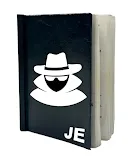IN MODERN MICROCHIPS, where
some transistors have been shrunk to less than a 10th of the size of a Covid-19 virus, it doesn't take much to mess with the minuscule electrical charges that serve as the 0s and 1s underpinning all computing.
A few photons from a stray beam of light can be enough to knock those electrons out of place and glitch a computer's programming. Or that same optical glitching can be achieved more purposefully—say, with a very precisely targeted and well timed blast from a laser. Now that physics-bending feat of computer exploitation is about to become available to far more hardware hackers than ever before.
At the Black Hat cybersecurity conference in Las Vegas next week, Sam Beaumont and Larry “Patch” Trowell, both hackers at the security firm NetSPI, plan to present a new laser hacking device they're calling the RayV Lite.
Their tool, whose design and component list
they plan to release open source, aims to let anyone achieve arcane laser-based tricks to reverse engineer chips, trigger their vulnerabilities, and expose their secrets—methods that have historically only been available to researchers inside of well-funded companies, academic labs, and government agencies.
more
















